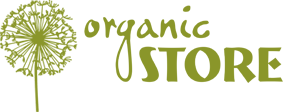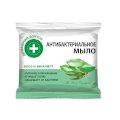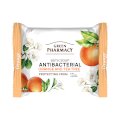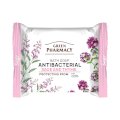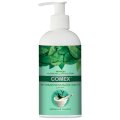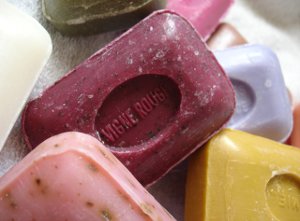 Antibacterial soap has become rather popular among consumers these days. It is a type of soap containing antibacterial agents such as triclosan, triclocarban, and chloroxylenol. The effectiveness of antibacterial soap has been disputed, and some consumers are weary of long-term health effects of its use. Is natural antibacterial soap any better? Let’s try to figure this out.
Antibacterial soap has become rather popular among consumers these days. It is a type of soap containing antibacterial agents such as triclosan, triclocarban, and chloroxylenol. The effectiveness of antibacterial soap has been disputed, and some consumers are weary of long-term health effects of its use. Is natural antibacterial soap any better? Let’s try to figure this out.
Triclosan is probably the best-known antibacterial and antifungal agent found in consumer products, including soaps, shampoos, toothpastes, mouthwashes, deodorants, and detergents. At low concentrations, triclosan acts as a bacteriostatic agent. In other words, it stops bacteria from reproducing by inhibiting fatty acid synthesis (bacteria need fatty acids to built and reproduce cell membranes).
Some studies have concluded that triclosan contributes to antimicrobial resistance. This means that if you use antibacterial soap on a regular basis, microbes will sooner or later become able to resist the effects of triclosan and other antimicrobial agents, rendering antibacterial soap virtually useless. Moreover, triclosan has been found to be a weak endocrine disruptor, though it is unclear whether this is relevant to humans.
Considering this, the U.S. Food and Drug Administration banned the use of triclosan and eighteen other chemicals used in antibacterial soap due to their lack of efficacy and insufficient information on the long term health effects of their use. The ban came into effect in September 2017. Does this mean that antibacterial soap has become a thing of the past? Actually, it doesn’t.
The manufacturers of natural and organic cosmetics have long been using natural ingredients with antibacterial effect to produce antibacterial soap. Most often, natural antibacterial soap is infused with essential oils. Practically all essential oils contain substances that have antimicrobial properties and eliminate bacteria by disrupting their membranes. Moreover, some essential oils contain substances that reduce bacterial resistance.
Some essential oils have more pronounced antibacterial properties than others. For example, tea tree oil, also known as melaleuca oil, has long been used to treat various skin conditions caused by bacterial or viral infections, including acne, herpes, and dandruff. It is extracted from the leaves of narrow-leaved tea-tree native to Queensland, Australia.
Tea tree has pronounced antibacterial properties, but its effectiveness against fungal infections has been questioned. It doesn’t irritate the skin and may be used externally in its diluted form without adverse effects. Antibacterial soap with tea tree oil is even safer because it contains a relatively small amount of essential oil which is very unlikely to irritate the skin.
The Ukrainian beauty brand Flora Secret offers handmade soap with tea tree oil. The brand specialises in the production of natural essential and carrier oils, as well as handmade soap bars based on these oils.
Handmade Antibacterial Soap by Flora Secret is formulated with tea tree essential oils and kaolin (white clay). Both ingredients are valued for their anti-inflammatory and bactericidal effect. You can use the soap to take care of the skin of your face. Due to its antibacterial and anti-inflammatory effect, it helps to eliminate acne, tightens pores, and normalises sebum secretion.
The soap is free of synthetic surfactants, such as SLS/SLES (sodium lauryl/laureth sulphate), and doesn’t contain animal fat. It is based on a blend of high-quality vegetable oils (palm oil, coconut oil, sunflower seed oil, olive oil, almond oil, avocado oil, grapeseed oil, and castor oil) and infused with essential oils and white clay.
Another antibacterial agent that can be found in natural antibacterial soap is colloidal silver. Silver and silver compounds are toxic for bacteria and fungi because biologically active silver ions damage key enzyme systems in their cell membranes. Colloidal silver is added to various cosmetic and personal care products, including products specifically designed for children. For example, Pharma Bio Laboratory produces Antibacterial Baby Soap with an antibacterial complex based on silver ions.
The specialists of Pharma Bio Laboratory have created antibacterial baby soap based on a blend of medicinal herb infusions that takes good care of delicate and sensitive baby skin. It comprises infusions from beggarticks, chamomile, marigold (calendula), and plantain. These medicinal herbs are known for their anti-inflammatory and soothing effect, they complement and enhance the effect of silver ions. The soap cleanses the skin delicately yet effectively without disrupting its natural pH level or causing irritation.
You can buy natural soap with antibacterial effect in our online shop Organic Store. We offer a great selection of natural and organic soaps produced by reliable brands, such as Very Berry, Agafia’s Herbs, Green Pharmacy, Ambra, Home Doctor, Pharma Bio Laboratory, YAKA, Dr. Sante, Fresh Juice, Nubian Heritage, and others.
